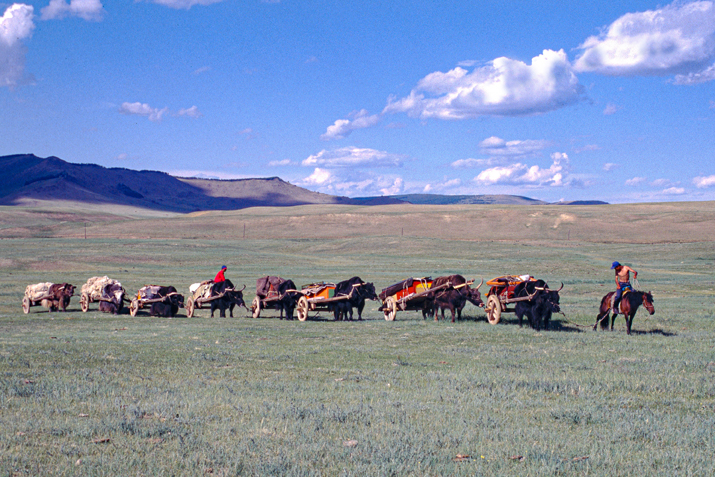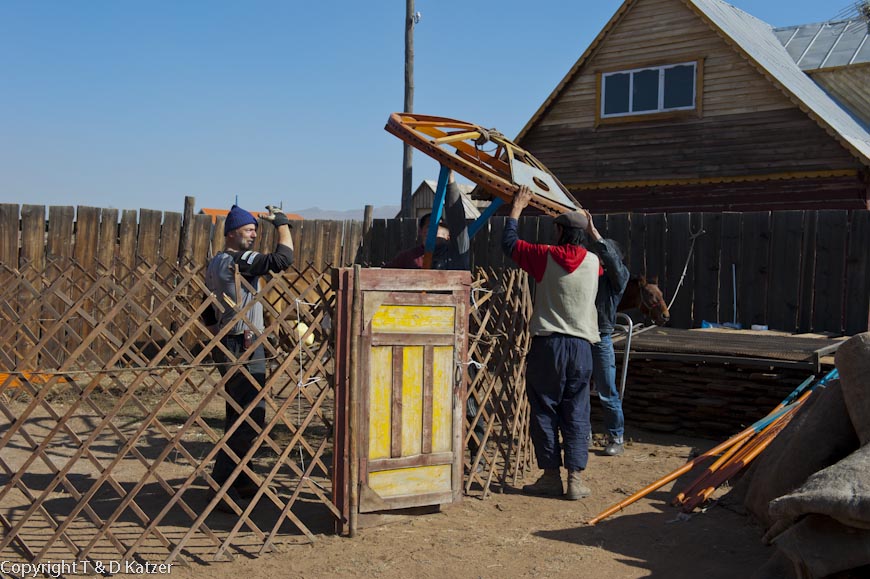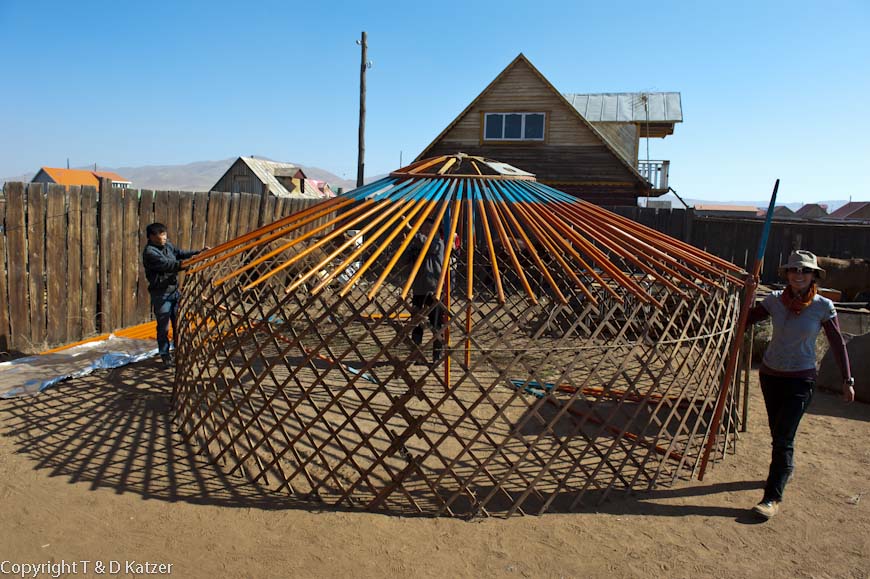
Ulzii wants his money
N 49°38'671'' E 100°11'496''
Day: 68
Sunrise:
07:16
Sunset:
19:02
Total kilometers:
777
Soil condition:
Dust/gravel
Temperature – Day (maximum):
20°C
Temperature – day (minimum):
18°C
Temperature – Night:
minus 5°
Latitude:
49°38’671”
Longitude:
100°11’496”
Maximum height:
1220 m above sea level





After a restful and pleasantly warm night, we have a simple breakfast of tea cookies and white bread. Then we go back to watering the horses. In fact, they ate all the hay. Saraa has posted an ad somewhere asking for hay but no one has responded yet. “Apparently the townspeople haven’t stocked up on hay. For whom and for what?” I say.
Suddenly Ulzii appears. “Hello!”, we greet him as friendly as possible. “Hello!” he replies, also in a friendly manner. “Denis, I want my salary,” he says. “Ulzii, can you remember the agreement we made in Erdenet? “I can. “We had agreed that the trip would go from Erdenet to Tsagaan Nuur.” “As far as Tsagaan Nuur?” “Ulzii, we had discussed this several times under witness with Taagi as a very good translator. You said several times that you agreed to it. Can you remember that now?” “Yes.” “Well, then you know that your salary will be canceled if you lose the horses during your guard shifts?” “Yes.” “And that you won’t get a salary if you leave the expedition early.” “What? I don’t know,” he says indignantly. “Don’t panic, we’re not brutes. You’ll still get your money. But don’t forget, we had your word and handshake to accompany us to Tsagaan Nuur. Besides, you didn’t even keep your word as far as your home town and got off the day before. You just left us sitting out there. Your pay should be docked for that alone. But as I said. You’ll get your money. We just have to go to the bank first,” I explain. A little later, Ulzii runs off like a defiant little boy. He doesn’t even say goodbye to us. This situation reminds me of his uncle, who is off to the middle with his salary advance. Is it because of the family? That’s strange. I don’t want to blame it on the Mongolian mentality. We have met too many great people for that and Bilgee is so far proof that there are very reliable people here. Ulzii is apparently not aware of how disrespectful and naughty he is behaving towards us. Also towards his family and Saraa, who recommended him to us as a very reliable man. Such behavior usually also reflects badly on the broker. We talk to Saraa about it without reproaching her and without blackening Ulzii’s name. But since she has been in the tourist business for 11 years, as we learned yesterday, she should know how her people work. “I’ll talk to him,” she says kindly.
We set up our yurt and Chinese scrap metal
In the afternoon we go to the market with Saraa and Bilgee to buy the first furnishings for our yurt. After a few hours we have a six square meter carpet in the back of the yurt, which will be the base for our sleeping area. For the front part we buy a linoleum floor of the same size, which is often used in yurts nowadays so that the dirt carried in can be easily removed. We buy a cannon stove, a three-meter-long exhaust pipe, iron tongs for the embers, a shelter for the stove, a wok that can be placed in the upper part of the cannon stove, brooms, scoops, water canisters and much more. Heavily laden, we take our treasures to Saraa’s log cabin. As we still need a table, chairs, shelves, a good axe, chainsaw for the winter, screws, nails, hammer and soon countless other things to set up a proper Mongolian household, we will be at the market almost every day for the next two weeks. Unfortunately, shopping in this country is quite expensive. You often don’t get what you want and have to go to lots of stores to get it. Apart from that, the quality of all the products is atrociously poor. Almost everything is produced in China and the Mongolians seem to get the waste from the Chinese economy. Everything, simply everything that comes from China breaks within a few days. Sometimes it doesn’t even work when you unpack it. Sometimes only for a few assignments. It’s a real horror. It starts with a razor that I bought from U.B. that fails after the first use. Water bottles, for example, leak no matter how tightly you screw them shut. Canisters burst, saws only cut a few logs until they give up the ghost. The blade of our axe even bent, even though we didn’t use it to chop stone or throw it a thousand meters down the mountain. Although, to be honest, I would have liked to. The expensive voltage changer for just under €100 worked for just five minutes. Then he was dead. The aluminum legs of folding chairs bend after a short period of use. Cords and carpets fray quickly. Fabrics lose their color after the first wash. Hinges and carabiners rust and break. Brooms lose their bristles and also break. I could go on and on with this list. It’s enough to make you tear your hair out. I would love to have a German DIY store or specialist retailer here where you usually get the quality you pay for. Although the lump does not cost much on average, it ends up being very expensive because it breaks immediately after use!!! The Mongolians themselves hardly produce anything. Even their traditional Deel clothing now comes from China. Their animal skins are sold to China at dumping prices and return to the country as expensive but poor-quality processed products. A joke, but unfortunately nobody can laugh about it. Of course, the Mongolians are aware of the terrible quality of the goods, but the individual citizen has no choice but to buy the stuff. Because there is nothing else. Except goods from Russia. The quality is apparently legendary. But again, hardly anyone here can afford it. The best Chinese chainsaw, for example, costs 120,000 tugrik (€68.57). The cheapest is 60,000 tugrik (€34.28). But the seller seriously warns against buying it. It will probably blow up in your face the first time you start it. A Russian chainsaw, on the other hand, costs 650,000 tugrik (€ 371.42). Because I don’t need any trouble when cutting wood at minus 30 or 40 or maybe 50 degrees, I would have bought them. But I could hardly lift the heavy part. These saws are most likely built for men who have a back like a grizzly bear. So I bought the best Chinese chainsaw in the hope that it would do the job.
In the meantime, Sara’s husband and two friends are busy setting up the yurt. It’s an old, run-down, totally dusty thing, broken in various places and a bit dilapidated, but it’s good enough for our stay here. We pay 3.2 days’ wages, i.e. 20,000 Tugrik (11.42 €), to transport the yurt from friends to Sara’s place. A proud price, but it also weighs around 400 kilograms. After about two hours, the typical Mongolian dwelling stands in the dusty garden of Saraa. We immediately roll out the carpet and linoleum floor and carry all our equipment from Sara’s house inside. We stand in our Mongolian house, thrilled to have our first yurt in our lives. We give Bilgee the iron bedstead which is part of the yurt. He sleeps on his left side. We set up our sleeping camp behind the cannon stove on the carpet. On the right-hand side I put my folding chair, which I have already cycled from Germany to Mongolia. “I can write really well there,” I say, placing my energy box next to it. Tanja also sets up her kitchen on the right-hand side. We set up a few tin boxes that I bought at the market. “It’s a wonderful shelf,” says Tanja happily and immediately starts putting food, plates and pots on it. To the right of the door there is space for water canisters and a car battery, which I connect to the solar panels on the yurt roof using the energy box. To the left of the door we have placed a tin box for the firewood. “Not bad for a start,” I say, satisfied. Bilgee laughs. “Zugeer, zugeer”, (it’s okay, it’s okay) he is also happy. “This is our realm for the next two weeks. Now we have the opportunity to test everything under real conditions. We’ll soon realize what else we need for our wintering,” says Tanja. “That’s right, and it’s a good place to do all the paperwork and approvals,” I add.
As it gets dark, we light our stove for the first time. As soon as the wooden scabbard I have chopped burns, it immediately becomes hot. In a yurt like this it is either cold or hot. There is hardly any warmth. You could say it’s a sauna climate. We cook a potato stew with vegetables in a large pot. We are just eating when Saraa visits us. She sits down on Bilgee’s bed. As already mentioned, such a yurt is strictly divided. The left-hand side, where Bilgee’s bed is, is actually intended for the male guests. But as we have everything full on the women’s side, our female guests always sit on the bed. “Would you like some of the stew?” asks Tanja. “Oh, thank you very much. I’ve already eaten,” Saraa politely declines. “We have a lot to do in the coming days. We have to pay a visit to the mayor and see some of my NGO members to explain to them why you are here and what we can do together in the future,” says Saraa. (The abbreviation NGO comes from non-governmental organization). Saraas NGO works to improve humane conditions in Mongolian prisons, for half-white children, for the reforestation of maltreated Mongolian forests and for the social and health problems of the Tsataans. In the course of the conversation, we work on a plan for how we can support Saraas NGO with our life project “The Great Journey”. “We have to hurry because of the coming winter. We’ve allowed two weeks in Mörön. Will that be enough?” I ask Saraa. “I think so. If we work with focus, we can do it. However, because of my baby, I’m often difficult to get away, but we’ll manage,” she replies and laughs.
I only blow out the candle at midnight today. Tanja and I slip under our sleeping bags while Bilgee lies down on the old bedstead, which bends with difficulty. As soon as the flames have gone out in our little oven, it gets cold. Just as cold as in our tent. But having a thick felt wall around us gives us a cozy feeling. So we spend the first pleasant night in our new temporary home.
We look forward to your comments!

